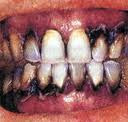All right. You're about to go to your date's house to pick her. You look at yourself in the mirror. Hair: check. Clothes: no wrinkles. Socks: clean. Face: You just shaved (looking good, man).
You're ready. You drive over to her house, nervous but fairly confindent. You knock, wait, the she opens the door. "Hi" you say. Her face turn from excited to unbelief and disgust. You cast about in your mind for the problem. You checked everything before you left right? Oh great, I forgot to brush my teeth! You decide to simply grin and bear it until its over, and then you will be a hermit living in Antarctica with no contact with humanity, especially women, and especially that girl.
Hopefully this scene has never happened to you, but it does bring home the point of the importance we put on clean teeth and nice smelling breath. I can't even remember when I never brushed my teeth. I can only remember as a kid my mom telling to brush again if I failed her inspection and my parents horror that we were in a public place and that I had food in my teeth.
The toothbrush seems to have its origins in the chewing sticks of Babylonia as early as 3500 BC. Ancient Greek and Roman literature discusses the use of toothpicks. The toothpick evolved into the chewstick, which was about the size of a pencil. The ancient Chinese chewed one end of the stick until it became brushlike, the other end was pointed and used as a toothpick. The twigs used for this were from aromatic trees and freshened the mouth as well.

As long ago as 5000 BC the Egyptians were making a tooth powder consisting of powdered ashes of ox hooves, myrrh, powdered and burnt eggshells and pumice (can you imagine ash and eggshell in your mouth, ugh!). The Greeks, the the Romans "improved" toothpaste by adding abrasives such as crushed bones and oyster shells. They also added powdered charcoal, powdered bark and more flavouring agents to improve breath. (Just a thought, how good would your breath smell if used bones and charcoal for toothpaste? Maybe someone should try that out for a date, some girls like a rebel.)
Keeping clean is something the elite can do much easier than the poor. While rich Egptians were using costly toothpaste and twigs, the poor used there fingers to spread around cheap ill-made toothpaste. The ancient elite also had the time to brush more frequently while the poor only did it ocasionally, if at all.
Some folk knowledge is hardly in use and is mostly in use as hobbies. People deplore the fact that few people sew or bake. But I've never heard of anyone complain that we don't make toothbrushes out of sticks or make toothpaste out of bones and charcoal.

This is so funny Murphy! I never really thought of toothbrushing as a type of folk knowledge but it really is! Teeth brushing in my house was such a ritual when we were little, all the kids would line up and my dad would brush our teeth for us one by one.... and then at some point between when I was 5 and now I started brushing my own teeth, though I can't remember exactly when that was or how that transition happened. This was so interesting though, who would have guessed back then that oral hygiene would be so important to us now!
ReplyDeleteThey definitely used a bunch of things that i would rather not have stuck in my mouth, thank goodness things have developed as much as they have. It was neat to read about the primitive "toothbrush" if that's what we can even call it. I guess "chew stick is more appropriate. Apparently the toothbrush that we know today didn't come around till the 1930's. I'm glad this type of knowledge doesn't require an institution or text to learn.
ReplyDeleteI do wonder though if something will ever replace the modern day toothbrush or the way we go about doing it in these days?
This post goes really well with the one about shaving legs. Hygiene in general seems to be something that is firmly in the realm of folk knowledge, both how to clean oneself and what degree of cleanliness needs to be achieved. All those toothpaste options from antiquity sound completely and totally gross to me, but hey, if you grew up with that, it would be normal. I wonder how well each of them worked.
ReplyDeleteFirst off, that picture is absolutely disgusting. I'm so glad I was born during the age of oral hygiene. In 8th grade we watched this show about a group of people in Asia. They would carve their teeth to make a pointy 'v' shape. It's interesting to think how different countries view beauty.
ReplyDeletehaha amanda that's super gross
ReplyDeleteDang, didn't think we had a blog post on Saturdays so I didn't check til now.
ReplyDeleteMy experience with teeth is two-sided. On one hand, they let me eat a lot of cool stuff like food. On the other, my teeth like to get cavities even though I really do take good care of them... It's a good thing dentists are around now to take care of what the 1930s-style toothbrush can't. Oral health really does seem to matter a lot more nowadays.
Murphy, good topic and I'm glad you brought in the historical elements, but you need to cite the sources that you used!
ReplyDeleteDiane, good to link this hygiene post with Amanda's about shaving.
As interesting are the differences among cultures regarding hygiene are the differences in how they transmit their ideas about hygiene. Is the family the main source of hygienic knowledge? Shuan blogged about this in her "Lather, Rinse, Repeat"